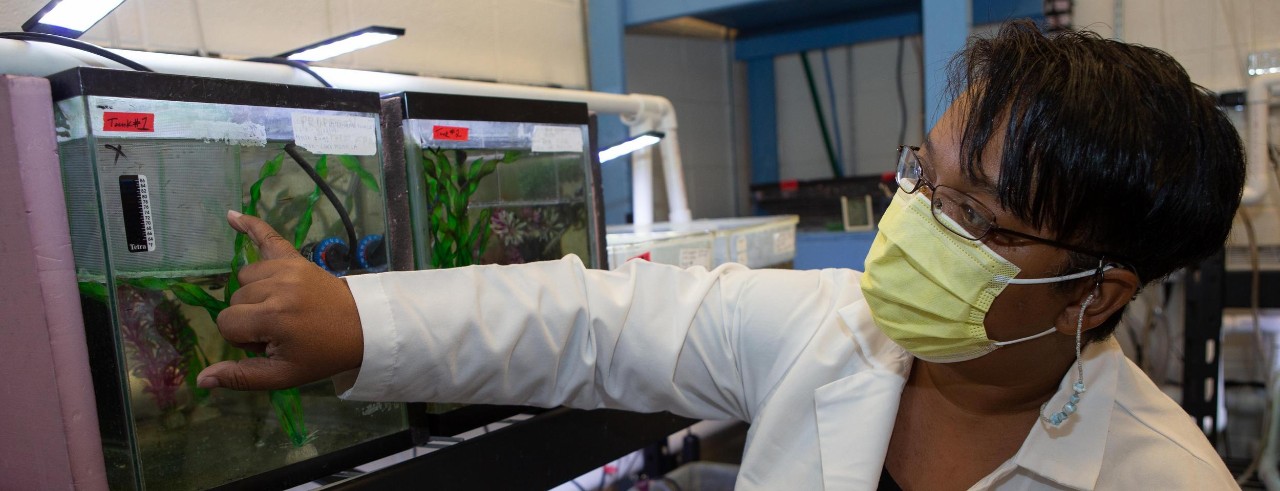
Spectrum News: UC biologist discusses water pollution
Aquatic toxicologist explains threats to Ohio's waterways
Spectrum News turned to a University of Cincinnati aquatic toxicologist to explain the pollution threats to Ohio's waterways.
Latonya Jackson, an assistant professor of biology in UC's College of Arts and Sciences, told Spectrum News that everyday contaminants can have harmful effects on aquatic wildlife.
“Fish are being affected by everything that we are putting in the water,” she said.

UC Assistant Professor Latonya Jackson studies live-bearing fish in her biology lab. Photo/Andrew Higley/UC Marketing + Brand
This was put in stark relief earlier this year when a train derailment in East Palestine spilled toxic chemicals into the Ohio River, killing fish and prompting treatment plants that rely on the river for drinking water to shut down temporarily.
Jackson joined Spectrum's In Focus host Mike Kallmeyer to discuss how pollution affects rivers, lakes and streams on Earth Day.
“As an aquatic toxicologist, I look at how different contaminants and pollution affect organisms and even humans — anything that comes in contact with the water,” she said.
In her lab, Jackson studies live-bearing fish to see how toxins in the water can harm not only adults but their babies as well.
Jackson said scientists today are studying contaminants of emerging concern, including personal-care products, microplastics, tire rubber and medicines that end up in waterways.
“Just about everything that we put down our drains is having a huge negative impact on fish,” she said.
Jackson said she has been following the environmental impacts from the train derailment. While contaminant levels quickly dissipate in the river, the chemicals can have a profound impact on generations of wildlife and the food chain, she said.
“We don't know how it will affect fish and other aquatic animals in the long term,” she said.
Watch the Spectrum News interview.
Featured image at top: UC Assistant Professor Latonya Jackson studies the long-term effects of chemicals on aquatic life. Photo/Andrew Higley/UC Marketing + Brand

UC College of Arts and Sciences Assistant Professor Latonya Jackson is an expert in aquatic toxicology. She studies how chemicals affect fish and other wildlife. Photo/Andrew Higley/UC Marketing + Brand
Related Stories
News Cincinnati loved in 2025
January 2, 2026
The story of prohibition bootlegger George Remus was among WLWT's favorite segments in 2025. UC Law Professor Christopher Bryant spoke with journalist Lindsay Stone about Remus using a temporary insanity defense during a murder trial.
What to know about this year’s big tax changes
January 2, 2026
Local 12 reported that taxpayers can expect some major changes this tax season. Gary Friedhoff, adjunct instructor at the University of Cincinnati’s Carl H. Lindner College of Business, recently spoke to Local 12 about how to avoid surprises.
Study finds police officers face higher long-term health risks
January 2, 2026
J.C. Barnes, a University of Cincinnati professor, is interviewed by Spectrum News about new research showing that the physical and psychological demands of law enforcement can contribute to earlier deaths.
